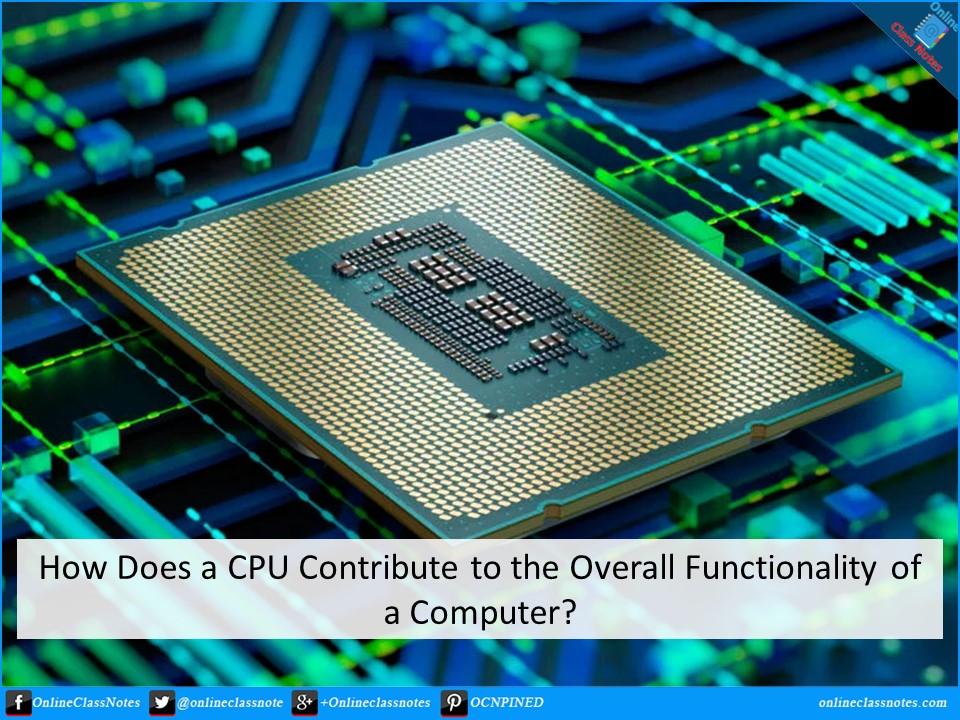The Central Processing Unit (CPU) is often referred to as the “brain” of a computer. It plays a pivotal role in the overall functionality of a computer system, serving as the core component responsible for executing instructions, processing data, and coordinating various hardware and software components. The functions of CPU in overall functionality of a computer can be categorized into several key aspects:
1. Instruction Execution:
The CPU executes program instructions fetched from memory. It performs a sequence of operations such as arithmetic calculations, logical comparisons, and data manipulation. These instructions are carried out through the fetch-decode-execute cycle, where instructions are fetched from memory, decoded to understand their purpose, and then executed.
Read More: What are the 6 steps followed by CPU in computer to Execute an Instruction?
2. Processing Power:
The CPU’s processing power determines how quickly it can execute instructions. Modern CPUs have multiple cores, allowing them to execute multiple instructions simultaneously through parallel processing. This significantly enhances the computer’s ability to handle complex tasks efficiently.

3. Data Management:
The CPU manages data movement between various components, including memory, storage devices, and input/output devices. It performs tasks like loading data into memory, accessing storage, and transferring data to and from peripherals.
4. Control Unit Functionality:
The CPU’s Control Unit manages the execution of instructions and ensures that they are carried out in the correct sequence. It also controls the flow of data between different components of the computer system.
Read More: What is control unit? What are the functions of control unit?
5. Arithmetic and Logic Unit (ALU):
The ALU is a critical component of the CPU that performs arithmetic operations (addition, subtraction, multiplication, division) and logical operations (AND, OR, NOT) on data. It is responsible for the core mathematical and logical processing within the CPU.
Read More: Discuss the organization and functions of ALU or Arithmetic & Logic Unit
6. Cache Management:
CPUs include various levels of cache memory to store frequently used data and instructions for quicker access. The CPU manages this cache memory to optimize data retrieval and execution speed.
Read More: What is memory access method? What are the different types of memory access methods?
7. Interrupt Handling:
The CPU manages and responds to interrupts, which are signals indicating events that require immediate attention, such as hardware requests or errors. The CPU temporarily halts its current operations to handle these interrupts.
8. Clock Synchronization:
The CPU’s clock generates a regular pulse that synchronizes the activities of all components. It ensures that instructions are executed at a consistent pace, maintaining the orderly flow of data and control signals.
9. Virtual Memory Management:
The CPU manages virtual memory, a technique that uses a portion of the hard drive as an extension of physical memory. This allows the computer to run larger programs than physical memory alone could support.
Read More: Types of computer memory based on access methods.
10. System Resource Allocation:
The CPU allocates system resources, including memory and processing power, to different programs and processes. It ensures fair and efficient distribution of resources among multiple tasks running simultaneously.
In essence, the functions of CPU’s are foundational to a computer’s operation. It processes instructions, manages data, coordinates tasks, and ensures the seamless functioning of hardware and software components, ultimately enabling the computer to perform a wide range of tasks from basic calculations to complex computations and applications.
References
1. Online Class Notes - What is CPU? What are the 10 functions of CPU? 2. Khan Academy - Central Processing Unit (CPU) 3. Tutorials Point - Computer - CPU(Central Processing Unit)